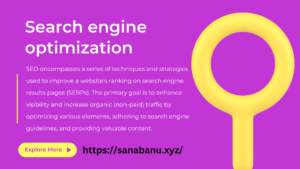A Comprehensive Guide to Search Engine Optimization-SEO
A Comprehensive Guide to Search Engine Optimization-SEO
Introduction:
In the digital age, Search Engine Optimization (SEO) stands as a cornerstone of online success. It’s the strategic process of enhancing a website’s visibility in search engine results, aiming to rank higher organically and attract more targeted traffic .In this guide, we unravel the complex layers of SEO, delving into its core components, strategies, and the evolving dynamics that redefine its landscape. From the nitty-gritty technical facets to the artistry of content creation and the strategic dance with search engine algorithms, we navigate through the ever-shifting terrains of Search Engine Optimization (SEO), providing you with the tools, insights, and foresight to ascend the ranks of search engine visibility.
Understanding Search Engine Optimization (SEO):
Search Engine Optimization (SEO) encompasses a series of techniques and strategies used to improve a website’s ranking on search engine results pages (SERPs). The primary goal is to enhance visibility and increase organic (non-paid) traffic by optimizing various elements, adhering to search engine guidelines, and providing valuable content.
Key Components of Search Engine Optimization (SEO):
- On-Page Optimization:
- This involves optimizing individual web pages to rank higher and earn more relevant traffic. Key factors include keyword optimization, high-quality content creation, meta tags, URL structure, and internal linking.
- Off-Page Optimization:
- Off-page SEO focuses on building a website’s authority and credibility through external factors, such as link building, social media engagement, and online mentions from reputable sources.
- Technical SEO:
- Technical SEO involves optimizing website infrastructure and backend elements for better crawling and indexing by search engines. It includes aspects like site speed, mobile-friendliness, structured data, and XML sitemaps.
- Content Optimization:
- Content is a vital aspect of SEO. Creating valuable, informative, and engaging content that aligns with user intent and incorporates relevant keywords is crucial for ranking high on SERPs.
Best Practices for Effective Search Engine Optimization (SEO):
- Keyword Research and Targeting:
- Conduct thorough keyword research to identify relevant terms and phrases your audience uses. Target specific keywords in content creation to improve visibility for related search queries.
- High-Quality Content Creation:
- Produce original, informative, and engaging content that addresses user queries. Valuable content not only attracts users but also earns backlinks and shares, boosting SEO.
- Mobile Optimization:
- Given the prevalence of mobile browsing, ensure your website is mobile-responsive for a seamless user experience. Mobile optimization contributes significantly to search engine rankings.
- User Experience (UX) Enhancement:
- Prioritize user experience by improving site navigation, readability, and page loading speed. Positive user experiences lead to higher engagement and better search rankings.
- Link Building Strategies:
- Foster a robust link-building strategy by obtaining high-quality backlinks from authoritative websites. Quality backlinks act as a vote of confidence for search engines.
- Regular Website Audits and Monitoring:
- Perform regular Search Engine Optimization (SEO) audits to identify issues, track performance metrics, and adapt strategies. Monitoring and analyzing data help in making informed optimization decisions.
- Schema Markup Implementation:
- Incorporate schema markup to provide search engines with additional context about your content, enhancing the chances of rich snippets and improved visibility.
The Evolving Landscape of Search Engine Optimization (SEO):
- Voice Search and Featured Snippets:
- With the rise of voice assistants, optimizing for voice search and aiming for featured snippets is becoming increasingly crucial for SEO success.
- Artificial Intelligence (AI) in Search Algorithms:
- Search engines like Google utilize AI-powered algorithms for better understanding and ranking content. Staying updated with AI advancements is pivotal for effective Search Engine Optimization (SEO) strategies.
- Local SEO and Google My Business:
- Local SEO optimization for businesses targeting specific geographical areas is essential. Utilizing Google My Business effectively helps in local search visibility.
-
- Core Web Vitals and Page Experience Update:
- Google’s emphasis on user experience led to the introduction of Core Web Vitals as ranking factors. Factors like page loading speed, interactivity, and visual stability impact how Google assesses the overall user experience. Optimizing these elements is crucial for ranking well in search results.
- Mobile-First Indexing:
- Google’s shift towards mobile-first indexing means that the mobile version of a website is considered the primary version for indexing and ranking. Ensuring mobile responsiveness, fast-loading pages, and a seamless user experience on mobile devices is imperative for SEO success.
- AI-Powered Search Algorithms:
- Search engines are increasingly leveraging artificial intelligence and machine learning algorithms, like Google’s Rank Brain, to understand user queries better and deliver more relevant results. Optimizing content to match user intent rather than just specific keywords is becoming vital.
- Video and Visual Search Optimization:
- With the rising popularity of video content and visual search technology, optimizing for video platforms like YouTube and leveraging image alt text and visual elements for search engines like Google Images is essential for comprehensive SEO strategies.
- Privacy and Security Considerations:
- Enhanced focus on user privacy and security, such as the adoption of HTTPS protocol, secure browsing, and compliance with data privacy regulations like GDPR (General Data Protection Regulation), plays a role in SEO rankings. Secure websites are favored by search engines.
- Semantic Search and Natural Language Processing (NLP):
- Search engines are evolving to understand natural language queries better. Optimizing content for semantic search and using structured data markup to provide context and relevancy helps search engines understand content better, leading to improved rankings.
- Local and Voice Search Optimization:
- Local SEO for businesses targeting specific geographical locations and optimizing for voice search due to the proliferation of voice-activated devices like smart speakers are emerging as critical SEO components. Optimizing for local intent and long-tail conversational queries is essential.
- Intent Optimization and User-Centric Approach:
- A shift towards understanding user intent rather than solely focusing on keywords is reshaping SEO strategies. Creating content that directly addresses users’ queries and needs aligns with search engines’ goal of delivering the most relevant results.
- Algorithm Updates and Adaptation:
- Regular algorithm updates by search engines like Google demand constant adaptation. Staying informed about updates and algorithm changes and adjusting strategies accordingly is crucial for maintaining and improving rankings.
- Core Web Vitals and Page Experience Update:
Conclusion:
Search Engine Optimization (SEO) is a multifaceted discipline that requires continuous adaptation and refinement. By incorporating on-page, off-page, technical, and content optimization strategies, businesses can significantly improve their online visibility and attract organic traffic. Staying informed about Search Engine Optimization (SEO) trends and best practices is vital for staying ahead in the digital landscape, ultimately leading to increased brand visibility, engagement, and business growth. The evolution of Search Engine Optimization (SEO) is a dynamic process, influenced by technological advancements, changing user behaviors, and search engine algorithm updates.
Another interesting blog you can check it out here
Why is SEO important for websites?
Discussing the importance of SEO in driving organic traffic, improving website visibility, and enhancing online presence.
What are the key components of SEO?
Explaining the fundamental elements such as keywords, on-page optimization, off-page optimization, link building, and technical SEO.
What are the best SEO practices for content creation?
Discussing strategies for creating SEO-friendly content, including keyword research, quality content creation, and optimizing for user experience.


